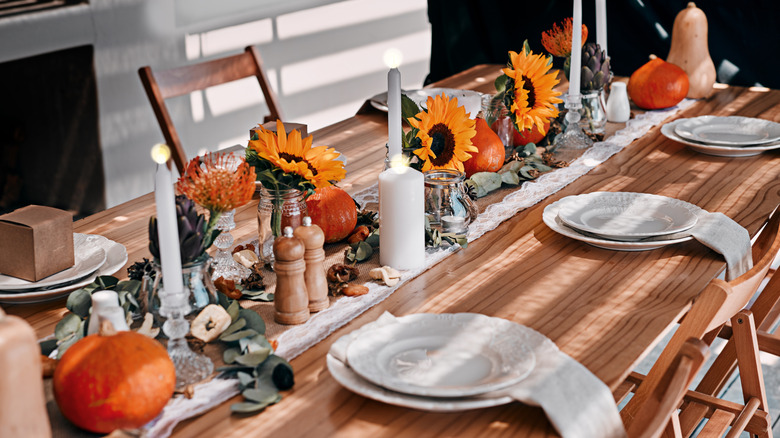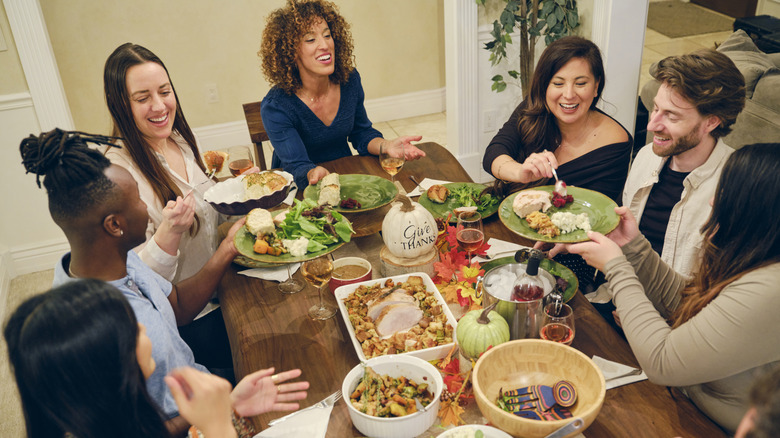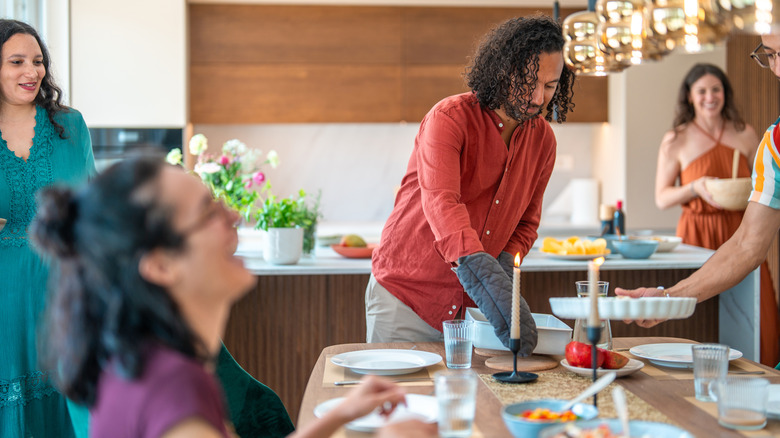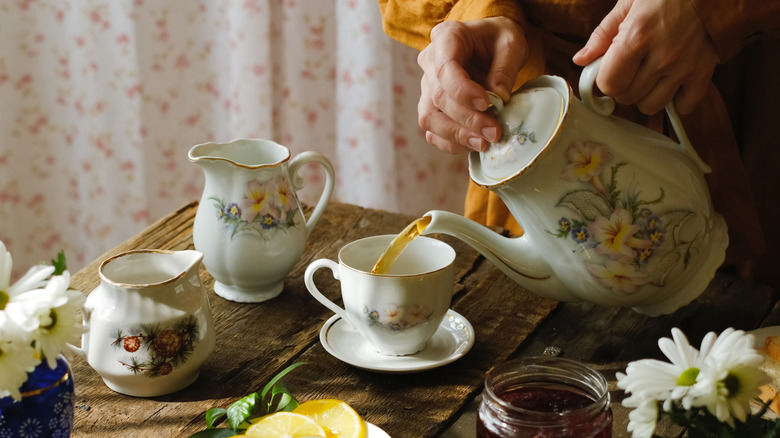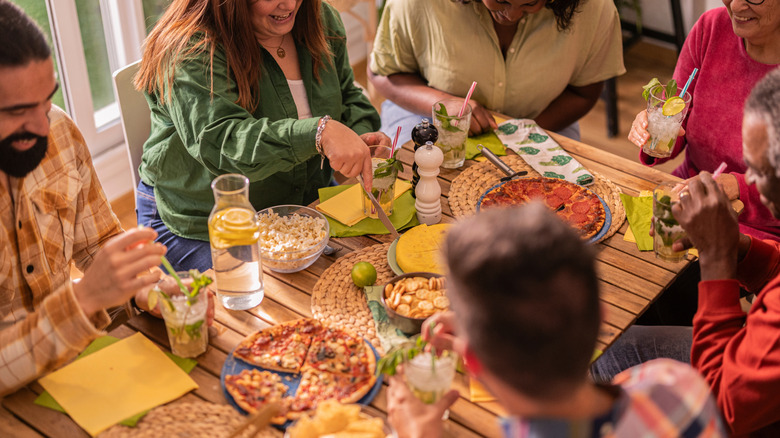11 Once-Popular Home Entertaining Trends We're So Over
If you're one of those folks who enjoy hosting parties and holidays at your home, you may be wondering if any of the things you're doing are outdated. When it comes to being a host, there are definitely some do's and don'ts. Home entertaining trends have changed a lot over the years, perhaps due to the pandemic that happened a few years ago. Or maybe it's just that people no longer enjoy having a bunch of guests traipsing around their homes. If you're still one of those who loves inviting your friends and family over for meals, fun, and conversation, be sure that you're offering everyone the best experience possible.
To ensure everyone enjoys your party, we suggest reconsidering these once-popular home entertaining trends that are out of style, as your guests are probably over them, too. One change that's taken place over the past decade is that most party invites come via social media or email. That's just the tip of the iceberg when it comes to the evolution of entertaining at home, though. Let's look at what else has changed.
Ignoring the dietary needs of your guests
It may not seem like it should be your responsibility to worry about the dietary needs of party guests. It's not polite to ignore this, though, since so many people live with food allergies and intolerances or follow specialized diets for their health. While you don't need an entire table of gluten-free foods for someone who can't have gluten, you still want to ensure they can safely dine. These days, special diet foods are made to taste better than they have in the past. So, don't shy away from serving them. There are also great naturally gluten-free and vegan foods, such as fruits and vegetables, which make excellent finger food.
Confining guests to one room
Is there a reason why the party needs to stay in the dining room? Maybe you didn't have time to clean the rest of the house, or perhaps you don't want to have to re-clean the entire house when guests leave. Either way, it's nicer and more comfortable when guests can roam a little. If people can go outside or into the living room, for example, they can have conversations away from the table without feeling like they have to talk over the rest of the group. Eating around the table is one thing, but let the party spread out a bit.
Striving for perfection (and missing the party)
When you're the only host to guests visiting your home, it can become overwhelming. You get focused on making sure everything turns out perfect, at the expense of not actually enjoying time with your guests. Remember that your friends and family are coming to your home to see you, not have you wait on them. Instead of getting too engrossed in playing the host, let your guests help out with some of the duties during the party and the chores afterward. If a guest wants to help with cleanup, let them — it'll free up some time for you to chat with guests you haven't yet spoken to.
Letting the meal overshadow the guests
Another factor that often prevents a party host from enjoying the event is the need for tedious meal preparation. There's nothing wrong with asking some friends or family to help out with meal prep, make it a potluck, or even throw together some charcuterie ahead of time instead of going through all that baking and cooking. Of course, if you're hosting a big feast, like Thanksgiving, it may be tradition. That doesn't mean others can't help, though. If you are hosting Thanksgiving, you'll want to prep so there's less to do during mealtime.
Having a pourer at your tea party
Are tea parties still a thing? Yes, they are, in fact. Sitting around a table with your friends, all dressed to the nines, is an enjoyable way to spend time catching up. One thing that has changed about these parties is that hosts no longer have one specific person there to do all the tea pouring. Unless you plan to hire someone for this "position," asking a friend to be your pourer seems a bit rude — especially if they weren't part of the party to begin with. As the host, you can pour tea just as well or allow guests to get it themselves.
Hosting an actual ball
The idea of a bunch of adults decked out in tuxedos and ball gowns sounds a bit old-school — and it should. When elaborate balls were a big thing, they had all sorts of rules, like how many orchestras needed to be playing, among other things. Most people don't have the time or money to waste on something so extravagant — unless you're hosting a fun masquerade ball for Halloween or something. You're better off setting up a memorable dinner party without all the fancy clothing.
Not creating a safe space
Gone are the days when creepy men and women preyed on people who weren't interested in them at parties. If you're hosting a party, now is the time to ensure that your space is a safe one. If someone is made to feel uncomfortable by another guest, as the host, it's your job to rectify the situation. Let people know ahead of time, even, that this sort of stuff won't be tolerated at your party. Safe spaces can also mean ensuring that all types of people feel welcome at your party and that conversations are friendly.
Not using reusable serving supplies
Plastic silverware and paper plates may make cleanup easier once your party or picnic is over, but consider the state of the planet and how much trash is already sitting in landfills. Instead of using throw-away stuff to take some of the work out of the clean-up, enlist help so you don't have to do it all on your own. You could even throw a cleaning party after the meal is done. If you still want to use disposable products, reconsider tossing these things in the fire if your party is outdoors. Toxins from plastic, silverware, and coated paper plates are released into the air.
Having the hostess be the only one to answer the door
As the host of a party, you can't be everywhere all at once. Someone has to answer the door as guests arrive, and you're not going to have time to worry about who is doing it if you're busy with other tasks. The key is to ensure your guests know that if someone is near the door and hears a knock, they can feel free to answer. No single person needs to be specifically in charge of this task.
Rules about who to talk to and when
Apparently, there have been rules in the past about who should sit at the same tables, according to Style Me Pretty. For the sake of conversation, it seems that people with similar sensibilities, to put it politely, would be sequestered in groups for dining experiences, perhaps to ensure everyone would have something to chat about. The thing is, you can learn so much from and about people if you're not forced to only talk to certain folks at a party. Even if people seem to group in a certain way, as the host, you could come up with some party games that encourage mingling with new people.
Having a seating chart
Speaking of seating — gone are the days of seating charts. While this is still common and often necessary at weddings and larger parties, it offers guests a more comfortable experience when they can choose their own seating spaces. Letting people choose their own seats helps your guests feel welcomed and respected, and can also help them avoid uncomfortable interactions. As previously mentioned, encouraging people to get to know each other can be done through games and other activities. There's no need to force conversations during a meal.
